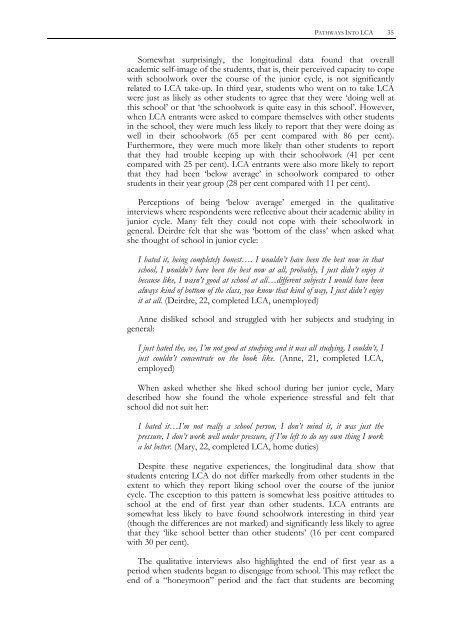Student Experiences of the Leaving Certificate Applied Programme
Student Experiences of the Leaving Certificate Applied Programme
Student Experiences of the Leaving Certificate Applied Programme
Create successful ePaper yourself
Turn your PDF publications into a flip-book with our unique Google optimized e-Paper software.
PATHWAYS INTO LCA 35Somewhat surprisingly, <strong>the</strong> longitudinal data found that overallacademic self-image <strong>of</strong> <strong>the</strong> students, that is, <strong>the</strong>ir perceived capacity to copewith schoolwork over <strong>the</strong> course <strong>of</strong> <strong>the</strong> junior cycle, is not significantlyrelated to LCA take-up. In third year, students who went on to take LCAwere just as likely as o<strong>the</strong>r students to agree that <strong>the</strong>y were ‘doing well atthis school’ or that ‘<strong>the</strong> schoolwork is quite easy in this school’. However,when LCA entrants were asked to compare <strong>the</strong>mselves with o<strong>the</strong>r studentsin <strong>the</strong> school, <strong>the</strong>y were much less likely to report that <strong>the</strong>y were doing aswell in <strong>the</strong>ir schoolwork (65 per cent compared with 86 per cent).Fur<strong>the</strong>rmore, <strong>the</strong>y were much more likely than o<strong>the</strong>r students to reportthat <strong>the</strong>y had trouble keeping up with <strong>the</strong>ir schoolwork (41 per centcompared with 25 per cent). LCA entrants were also more likely to reportthat <strong>the</strong>y had been ‘below average’ in schoolwork compared to o<strong>the</strong>rstudents in <strong>the</strong>ir year group (28 per cent compared with 11 per cent).Perceptions <strong>of</strong> being ‘below average’ emerged in <strong>the</strong> qualitativeinterviews where respondents were reflective about <strong>the</strong>ir academic ability injunior cycle. Many felt <strong>the</strong>y could not cope with <strong>the</strong>ir schoolwork ingeneral. Deirdre felt that she was ‘bottom <strong>of</strong> <strong>the</strong> class’ when asked whatshe thought <strong>of</strong> school in junior cycle:I hated it, being completely honest…. I wouldn’t have been <strong>the</strong> best now in thatschool, I wouldn’t have been <strong>the</strong> best now at all, probably, I just didn’t enjoy itbecause like, I wasn’t good at school at all…different subjects I would have beenalways kind <strong>of</strong> bottom <strong>of</strong> <strong>the</strong> class, you know that kind <strong>of</strong> way, I just didn’t enjoyit at all. (Deirdre, 22, completed LCA, unemployed)Anne disliked school and struggled with her subjects and studying ingeneral:I just hated <strong>the</strong>, see, I’m not good at studying and it was all studying, I couldn’t, Ijust couldn’t concentrate on <strong>the</strong> book like. (Anne, 21, completed LCA,employed)When asked whe<strong>the</strong>r she liked school during her junior cycle, Marydescribed how she found <strong>the</strong> whole experience stressful and felt thatschool did not suit her:I hated it…I’m not really a school person, I don’t mind it, it was just <strong>the</strong>pressure, I don’t work well under pressure, if I’m left to do my own thing I worka lot better. (Mary, 22, completed LCA, home duties)Despite <strong>the</strong>se negative experiences, <strong>the</strong> longitudinal data show thatstudents entering LCA do not differ markedly from o<strong>the</strong>r students in <strong>the</strong>extent to which <strong>the</strong>y report liking school over <strong>the</strong> course <strong>of</strong> <strong>the</strong> juniorcycle. The exception to this pattern is somewhat less positive attitudes toschool at <strong>the</strong> end <strong>of</strong> first year than o<strong>the</strong>r students. LCA entrants aresomewhat less likely to have found schoolwork interesting in third year(though <strong>the</strong> differences are not marked) and significantly less likely to agreethat <strong>the</strong>y ‘like school better than o<strong>the</strong>r students’ (16 per cent comparedwith 30 per cent).The qualitative interviews also highlighted <strong>the</strong> end <strong>of</strong> first year as aperiod when students began to disengage from school. This may reflect <strong>the</strong>end <strong>of</strong> a “honeymoon” period and <strong>the</strong> fact that students are becoming

















